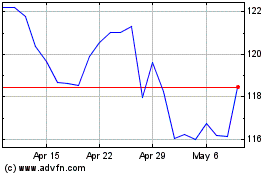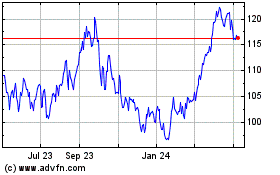U.S. Sanctions, Low Oil Prices Doomed Exxon's Russian Projects--2nd Update
March 01 2018 - 3:38PM
Dow Jones News
By Russell Gold
U.S. sanctions against Russia prevented Exxon Mobil Corp. from
pursuing ambitious plans to explore for oil north of Siberia. But
the final blow, some experts said, may have been delivered by lower
oil prices.
The Texas oil giant said in a regulatory filing late Wednesday
that it would walk away from the joint venture with
state-controlled PAO Rosneft to seek oil in the ice-choked waters
of the Kara Sea, a hard-fought deal signed in 2012 by the company's
former chief executive, Rex Tillerson, now U.S. secretary of
state.
Mr. Tillerson touted the agreement as a breakthrough giving
Exxon access to one of the world's great unexplored oil and gas
basins. The company reportedly spent about $700 million to drill
the first well, likely making it the most expensive ever. It struck
oil, according to Rosneft, but further exploration was halted
because of U.S. sanctions imposed by the Obama administration
following Russia's intervention in Ukraine in 2014.
Exxon unsuccessfully sought waivers that would allow it to
proceed in some areas in Russia -- a campaign that formally ended
with President Donald Trump declining to waive sanctions for the
company's Rosneft ventures last year. The U.S. also added new
sanctions on Moscow last year for its alleged interference in the
2016 presidential election.
But in the meantime, something else happened: Oil prices
plunged, and the global chase for new supplies changed. The deal
was struck when oil prices topped $90 a barrel and prospects for
them remaining high seemed likely. Oil is now trading at just over
$60 a barrel, and many companies, including Exxon, are pursuing
shorter-cycle projects such as drilling in the Permian Basin of
Texas and New Mexico that can deliver returns more quickly.
"A high-risk Arctic project that maybe looks good at $100 oil
does not look like anything anyone would touch at $60," said Edward
Chow, a senior fellow at the Center for Strategic and International
Studies in Washington, D.C. "I think that is a fundamental to the
Exxon decision."
Exxon declined to comment on the reasons for its decision. The
company said it would formally begin to withdraw from the Rosneft
joint ventures this year, taking a $200 million loss after
taxes.
Rosneft said in a statement carried by Russian news agencies
that it would support the return of Exxon to the projects in the
future if it were legally possible.
Drilling an offshore well in a remote Arctic region is
technically and logistically complex. Every piece of equipment
needs to be brought in from hundreds of miles away, through
inhospitable weather.
Royal Dutch Shell PLC ended a $7 billion exploration effort in
the seas north of Alaska in 2015 after prices fell and one of its
drilling rigs ran aground in foul weather.
Exxon CEO Darren Woods, who took over after Mr. Tillerson
resigned to become secretary of state, has steered the company in a
new direction in a bid to reverse slumping oil output and financial
struggles. He plans to triple production in the Permian Basin and
has touted vast new discoveries off the coast of Guyana in South
America.
Exxon is still heavily invested in Russia via an oil project off
the Pacific island of Sakhalin that predated the U.S. sanctions. In
2016, it produced 234,000 barrels a day of oil from Russia and the
Caspian Sea region, about 10% of its output.
But given the state of U.S.-Russia relations, it was unlikely
work on the other deal Mr. Tillerson had brokered would recommence
anytime soon. The joint venture between Exxon and Rosneft included
exploration in the Kara Sea, as well as other collaborative efforts
in Russia and the U.S. Exxon funded the exploration work entirely,
earning a 33.3% stake in any discoveries.
"It's a combination of financial decision making but also
recognizing that the risk-reward balance is out of whack in Russia
right now," said Ken Medlock, director of the Center for Energy
Studies at Rice University in Houston. "If we were in a $120 oil
world, I highly doubt this decision would have been made."
If oil prices rise and sanctions are removed there is nothing
stopping Exxon from rekindling its relationship with Rosneft.
Experts say it is unlikely Rosneft will be able to find another
company able to step in to Exxon's role -- either due to European
sanctions or a lack of technical capabilities to drill offshore
wells.
Thus, Exxon's decision, and the sanctions, will slow the
Kremlin's efforts to unlock significant new resources that could
help Russia maintain its position as the world's largest crude
producer.
Russia's federal budget relies on oil and gas sales for around
one-third of its revenues. Without technology from partners such as
Exxon, Russia will struggle to access those resources, analysts
say, although it has plenty of other onshore fields to maintain
production.
--James Marson and Michael Amon contributed to this article.
Write to Russell Gold at russell.gold@wsj.com
(END) Dow Jones Newswires
March 01, 2018 15:23 ET (20:23 GMT)
Copyright (c) 2018 Dow Jones & Company, Inc.
Exxon Mobil (NYSE:XOM)
Historical Stock Chart
From Mar 2024 to Apr 2024

Exxon Mobil (NYSE:XOM)
Historical Stock Chart
From Apr 2023 to Apr 2024
